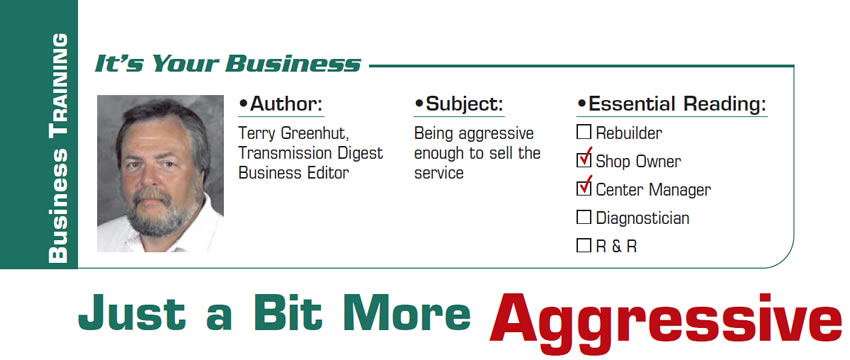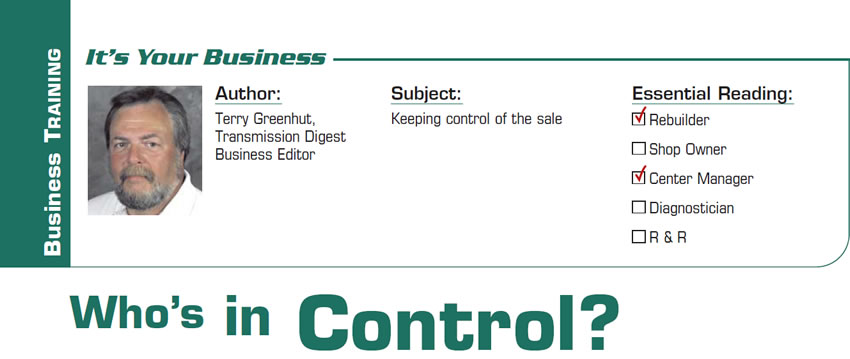The Rules of Selling in the Automotive Trades – Part 5
Selling can be hard work that pays off well or easy work that doesn’t. While it may not be a major rule of selling it is a very important one. It has to do with how hard you want to work physically as opposed to mentally. Again, like as in most other areas, you have a choice. You can either work hard at learning how to deal with customers to get what you need for the success of your business or if you don’t want to do that you can work on lots of cars, well into the night at times, to make up for the fact that you aren’t selling jobs the way they need to be sold to do what’s right for both you and your customers.

Elevate Yourself from Order-Taker to Salesperson
Every time you answer the phone, you have an opportunity and a choice.
The opportunity: Somebody is calling you because they need or want something.
The choice: You can give them information or you can give them a reason to buy from you.
Before you answer that next call, think “What’s my goal?” Hint: If your goal is to give them prompt, courteous information, you’re only a fraction of the way there.

Are You an Order Taker or a Salesperson?
There’s an argument going on and it’s time for me to weigh in. For years I’ve heard managers complain that their salespeople are “lazy order takers.” I’ve witnessed teammates jab at one another by delivering the lowest of all low-blow insults: “You’re nothing but an order taker.”

The Stigma of Sales
There are two kinds of people in the world – cat people and dog people. Wait, no. That’s not the point of this article. There are two other kinds of people in the world – people who love sales and people who hate sales. And, then, there are those who hate salespeople and those who love salespeople. From my own experience, I have found that there are far more Americans who detest salespeople than there are those who love (or even like) salespeople.

Do You Sell Enough to Keep Your Technicians Busy?
Technicians can play a big part in the sales process, thereby controlling their own destiny to some degree. They can and should be doing an excellent job of checking out each vehicle that comes into their bay no matter why it is initially there. They should make all repair and service recommendations to the service adviser even if they find so many items that it might scare them. The service adviser’s job is to sort them all out, check the vehicle’s history to see what has already been done and decide what the customer really needs now, what can be put off for a little while and what can wait even longer; then he or she has to do a stellar job of selling all those items and giving alternatives only if the customer can’t or is unwilling to have them all done now. The idea is to keep the vehicle on the lift and perform as many repairs and services as possible to save the technician from making unnecessary moves, allowing for maximum productivity.

Just a Bit More Aggressive
Many who sell repair and service work to customers are not, by nature, aggressive types. For the most part they’ve come up through the ranks, first being a technician, then a service writer and now a manager or owner. They tend to have a great deal of sympathy (way too much) for customers who say they can’t have the repairs they need performed now or that they can’t pay the prices being asked and want them lowered. Too many of us think from the customer side of the counter. We tend to put ourselves in their shoes and work very hard to understand their struggle to make ends meet because we know that the economy is not good and that a lot of folks are having trouble getting by.

Who’s in Control?
Customers often try to control our pricing by dropping subtle hints or making blatant displays of their mindset as to what they are willing, able or want to pay. Although we shouldn’t, many of us do let it affect the price we quote.

Sell It Slowly
If selling a rebuilt transmission or any other major repair were a race to see who could do it the quickest and probably for the least money, there would be lots of competition. Given the opportunity many of the owners, managers and service advisers in our business would shortcut the process to as few words as humanly possible, stated as quickly as their mouths can move. There may be several reasons why they are in such a hurry, but what they don’t realize is how much money this “need for speed” is costing them.

Narrowing Your Marketing and Sales Focus
Although you may want to keep doing every bit of promotion, you really need to question the generation of profit vs. the cost. If you are investing in forms of advertising just because you always did, you need to know whether they are still viable. Every ad you run needs to bring a good return on investment. If the results of any initiative can’t be measured, should you continue it?

Sharper and Sharper!
For many years trainers, myself included, have been teaching our industry owners and managers to do everything we can to keep the mystery in our trade, and to not freely give away our diagnostic and repair secrets to the motoring public and our competitors. Our education is something for which we paid dearly, and we should be compensated for providing it. As much as we would like to keep that information proprietary it’s getting more difficult every day, which is why our sales skills must become sharper.

Retrace Your Steps for an Easier Sale
When a customer calls to tell you about a transmission problem and possibly tries to get you to quote a price over the phone, a process has been started — one that, if handled properly, will go from the phone call to a shop visit, to a diagnosis, to the eventual sale of whatever repairs or services are necessary to solve the customer’s problem.

The Psychological Advantage
In any sales situation either the customer or the salesperson takes the psychological advantage, meaning that one is better able to read and control the other. We should be able to read our customers far better than they read us, because we practice these techniques every day but the customer uses them only occasionally.

